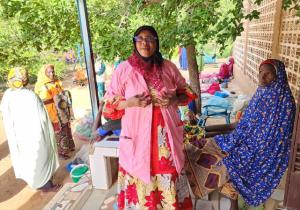Integrating female cancer screening into primary health care in Niger
Niamey ‒ In Niger, efforts are underway to mainstream screening for gynaecological cancers into primary health care services thanks to the WHO PEN approach, a WHO programme that aims to integrate the management of noncommunicable diseases (NCDs) into basic health care. This initiative, in its pilot phase, is being carried out in Mayahi District, Maradi Region, in the centre south of the country.
Through this programme, which is being implemented in the 50 integrated health centres of the district, over 3400 women were screened in 2023. Of this number, 148 were diagnosed with gynaecological cancers and given appropriate treatment.
In Niger in 2023, more than 11 000 women were screened, with 666 cases of breast cancer and 299 cases of cervical cancer detected. “WHO PEN is a great success. Thanks to this strategy, we were able to make early diagnoses, thus helping to reduce deaths linked to these cancers,” explains Dr Harouna Abdoulaye, technical officer at the WHO Country Office in Niger.
“Before WHO PEN, cases for screening were referred to distant health facilities, but now we can do the tests on the spot. This has significantly increased the number of women using the service,” says Illiassou Kadija Anza, a midwife and head of the maternity service in Mayahi, one of the nine districts covered by the WHO-funded intervention.
In sub-Saharan Africa, breast and cervical cancers account for more than half of all cancer cases in women. In many African countries, between 60% and 70% of women are diagnosed at an advanced stage of the disease and only one in two women will survive five years after a breast cancer diagnosis.
Two years ago, Hadjara Ousmane, an 80-year-old housewife and mother of nine children, decided to go for screening following the appearance of a painful lump in her breast. “It is thanks to my daughter-in-law, who is a community mobilizer, that I was accompanied to the Mayahi Integrated Health Centre. I was diagnosed with breast cancer and my left breast was removed,” said Hadjara. “I was encouraged to go for screening because the centre is near and the screening is free of charge. Otherwise, I might not have gone for the test. I was afraid of dying."
“Here, women are often ashamed and afraid of having cancer or do not go for screening due to lack of information about the disease,” says Illiassou. To encourage screening, WHO supported the organization of 40 awareness raising sessions and strengthened the skills of community mobilizers in the district. The training programme for health professionals covers essential aspects such as managing vaginal infections, improving the quality of health care and engaging with communities.
“The fight against cancer is quickly gaining ground in Niger thanks to increased access to screening,” emphasizes Dr Kadi Adamou, director of the noncommunicable diseases programme at the Ministry of Health. “Other key success factors of the initiative include improved universal health coverage, the training of oncology specialists, and the purchase of technologically advanced equipment such as the LINAC, an indispensable device used for external beam radiation treatments for patients with cancer.”
The challenge now is to generalize the new integrated care package to the 72 districts of the country to reach all women. Thanks to WHO PEN, Hadjara is in good health and can once again carry out her daily activities independently. “I appeal to all the women. No matter what your age may be, please go for screening. This is very important.”
Communications and marketing officer
Tel: + 242 06 520 65 65 (WhatsApp)
Email: boakyeagyemangc [at] who.int (boakyeagyemangc[at]who[dot]int)
Communications Officer
WHO Niger
Email:fatia [at] who.int (fatia[at]who[dot]int)




